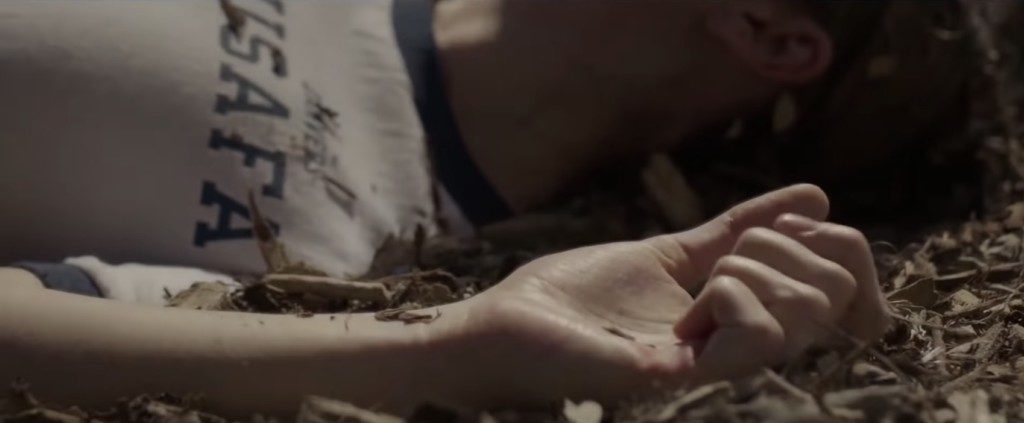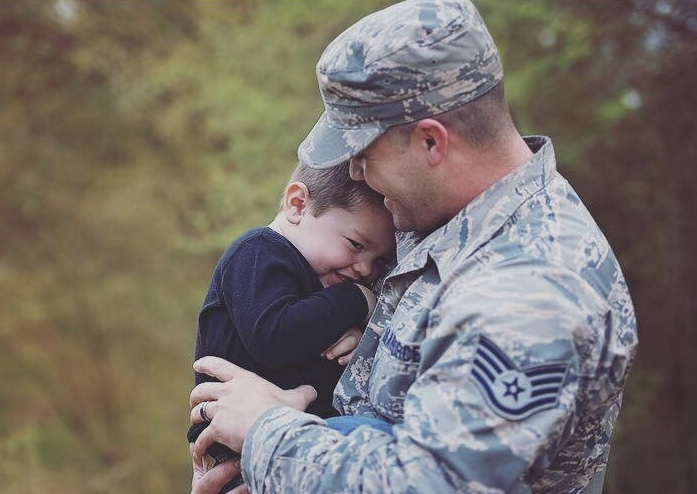The funny thing about a bruise: Sometimes you can’t see a bruise, but you can feel it. Other times it’s big and ugly and purple. Caused by trauma, these bruises may last a little or a long time. As a parent, it’s tough knowing that you can’t protect your child from getting a bruise every now and then. And no matter how much you decorate another move with excitement and bows, sometimes a new home and school does not feel like a gift, but a punch to the gut. Another deployment can shatter a tiny heart that’s just been pieced back together from the previous deployment.

Because a military child encounters family displacements and parental separations, these unique challenges can create a mix of emotions to include anxiety, excitement, fear, and pride. I always worried about how well-adjusted my military children would be. When my oldest came along, I knew she would have so many different experiences than I did growing up. I was not a military child. Would I be able to relate to her? Would she feel connected to a place? Would she learn how to manage and maintain friendships? What advice would I have to give to help her get through some of the unique situations that I never had to experience as a child?
My oldest becomes an official teenager this year. We’ve had over a decade to figure this military life out together. By all accounts, she is so much wiser than I was at her age. Still there are some bits of advice that as a non-military child, I can offer my teenage warrior:
Bruises fade. Lessons last.
Most bruises don’t last forever. They heal with time. Allow your body and mind to recover from traumatic or devastating experiences. The next PCS may hurt a bit … you will have to say goodbye to dear friends, start over (again) at a new school and find your niche in local sports and activities. In time, you will readjust and learn to adapt. These are growing pains that will serve you well later in life. Speaking of later in life …
Near rocks, far rocks
Don’t be in a rush to grow up.
Don’t be in a rush to get married and have kids.
Enjoy your youth and regard it with respect and appreciation.
As the youngest in my family, I couldn’t wait to get into high school. In high school, I couldn’t wait to get into college. In college, I couldn’t wait to get out on my own and start a family. While looking forward to the next big thing is good, you shouldn’t obsess over it. Leave the past in the past.
Live in the present, plan for the future, but don’t obsess over it.
You might hear your dad say, “Near rocks, far rocks.” He may be referring to the old arcade game Asteroids, in which you must destroy the near rocks (critical danger), but also keep in mind the far rocks (potential danger), but as a fighter pilot, his mind thinks this way. Plus, the game came out the year he was born.
Point is: Know your mission objective while being mindful of things that can get in your path.
Dream big. Then dream bigger.
Set goals and then set them higher. In one of my high school English classes, a question on an assignment asked if goals were important and why. The phrasing insinuated goals were necessary, so playing Devil’s Advocate, I insisted goals were not necessary; that we achieve our potential by sheer fate and fate alone. It was a cry for help. I didn’t know what goals to make; I didn’t know what was feasible. I thought for sure my teacher would set me aside and correct me. She didn’t.
Eventually, I learned the value of setting goals. It is not that we achieve our goals, but that we are changed as we strive and struggle along the way. We are not set adrift on life’s journey. If you set a course and navigate your way by making good choices, you will get to where you want to be. Fate plays a role in who you meet along the way but does not decide where you end up.
You do.
You will fail.
You will fail, but YOU are no failure. Failures are nothing more than life lessons to make you smarter, stronger and more capable. Sometimes you must repeat the lesson to learn the meaning of it. Be a fast learner and you will not live a lifetime of failures.
When you were little I took you and your siblings ice skating. I said, “You will fall down, and it might hurt a little; but you will get back up and keep going. Everyone falls down, but not everyone gets back up. And of those people who get back up, even fewer will have the ability to smile and laugh it off.”
Even Olympic ice skaters fall down, so the only shame is in not trying. Get up, smile (or smirk) and keep moving. If you don’t fall down when ice skating, you’re not trying hard enough.
BTW, have you seen the new Captain Marvel?! One of the best montages comes near the end of the movie when she pictures herself as a little girl standing up after every time she’s fallen down.
The moment that sold me on #CaptainMarvel pic.twitter.com/80XwwXzd8K
— Oliver Sava (@OliverSava) September 18, 2018
You are not special…
… but you are special to me. No one will love you like your family.
Friendships may come and go, but your family is forever. We are here for you. Respect and appreciate this simple fact. You are privileged to not have to worry about food or shelter. You’ve even been granted a good education, whether you like it or not. The activities you participate in may not always give out medals, trophies or badges, but they will reward you in ways you least expect.
Do not feel entitled to anything more than the love of family. You must work hard with consistency to earn anything more. Friendships require work, too. It took 16 months of swim lessons, 10 hours a week at the pool and nearly a dozen meets before you won your first bronze medal. Your family cheered for you. Win or lose, we always will cheer for you.

Know your own worth.
Do not settle on other people’s underestimations of you. Do not settle for someone’s perception of you. They only see the tip of the iceberg when it comes to your ambition and capabilities.
Surround yourself with people who talk about ideas…
… not other people. If you spend your time sitting around comparing yourself or putting down others, you will get nothing but a sour heart and superficial friendships. People who talk about ideas and act out of compassion will improve your mental and emotional intelligence. You choose how you spend your time and with whom; spend it wisely. It is a more precious than money. Money is something you can eventually get back. Time, once it is spent, is gone forever.
Success is not well defined.
Everyone’s version of success is different. You develop your own idea of success for yourself, not others. Do not assume you know someone or what makes them happy. Just as others may see just the tip of the iceberg that is you, don’t base your opinion of someone on one or two things that seem clear. Don’t think you know what is in a person’s heart just because you know one or two things about him or her.
Military children are not all born resilient. Many are forged in the fire.
Some final thoughts: Good people can make bad decisions and bad people can appear good; be prudent. You can’t control others, but you can control how you react to others; express temperance. You may not always be fearless, but you can face your fears if you are brave; have courage. When others do you wrong, you have the freedom to move on with or without forgiveness; that’s justice. If you remember anything, remember to demonstrate faith, hope and love.
You can be anything you want to be, so long as you are kind and have courage.











